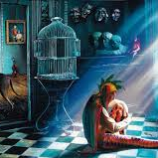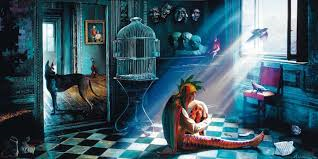Ruthlessness or non-pity
The sensation of being bottled up is experienced by every human being. It is a reminder of our existing connection with intent. For sorcerers this sensation is even more acute, precisely because their goal is to sensitize their connecting link until they can make it function at will. When the pressure of their connecting link is too great, sorcerers relieve it by stalking themselves.
That’s what ruthlessness is: a total lack of pity. Move your assemblage point to the precise spot where pity disappears. That spot is known as the place of no pity. The problem that sorcerers have to solve is that the place of no pity has to be reached with only minimal help.
Three classes of people
Stalkers who practice controlled folly believe that, in matters of personality, the entire human race falls into three categories. Sorcerers have long age learned that only our personal self-reflection falls into one of the categories.
People in the first class are the perfect secretaries, assistants, companions. They have a very fluid personality, but their fluidity is not nourishing. They are, however, serviceable, concerned, totally domestic, resourceful within limits, humorous, well mannered, sweet, and delicate.
In other words, they are the nicest people one could find, but they have one huge flaw: they can’t function alone. They are always in need of someone to direct them. With direction, no matter how strained or antagonistic that direction might be, they are stupendous. By themselves, they perish.
People in the second class are not nice at all. They are petty, vindictive, envious, jealous, self-centered. They talk exclusively about themselves and usually demand that people conform to their standards. They always take the initiative even though they are not comfortable with it. They are thoroughly ill at ease in every situation and never relax. They are insecure and are never pleased; the more insecure they become the nastier they are. Their fatal flaw is that they would kill to be leaders.
In the third category are people who are neither nice nor nasty. They serve no one, nor do they impose themselves on anyone. Rather they are indifferent. They have an exalted idea about themselves derived solely from daydreams and wishful thinking. If they are extraordinary at anything, it is at waiting for things to happen.
They are waiting to be discovered and conquered and have a marvelous facility for creating the illusion that they have great things in abeyance, which they always promise to deliver but never do because, in fact, they do not have such resources.
In the absence of self-importance
The trouble with us is that we take ourselves seriously. Whichever category our self-image falls into only matters because of our self-importance. If we weren’t self-important, it wouldn’t matter at all which category we fell into.
In the absence of self-importance, a warrior’s only way of dealing with the social milieu is in terms of controlled folly, to deal with the world exclusively in terms of controlled folly, which is the only bridge between people’s folly and the dictates of the Eagle’s purpose.
The technique of controlled folly
Within the art of stalking there is a technique which sorcerers use a great deal: controlled folly. Sorcerers claim that controlled folly is the only way they have of dealing with themselves—in their state of expanded awareness and perception—and with everybody and everything in the world of daily affairs.
Controlled folly is the art of controlled deception or the art of pretending to be thoroughly immersed in the action at hand—pretending so well no one could tell it from the real thing. Controlled folly is not an outright deception but a sophisticated, artistic way of being separated from everything while remaining an integral part of everything.
Controlled folly is an art. A very bothersome art, and a difficult one to learn. Many sorcerers don’t have the stomach for it, not because there is anything inherently wrong with the art, but because it takes a lot of energy to exercise it.
By the time we come to sorcery, our personality is already formed and all we can do is practice controlled folly and laugh at ourselves.
Related Articles














